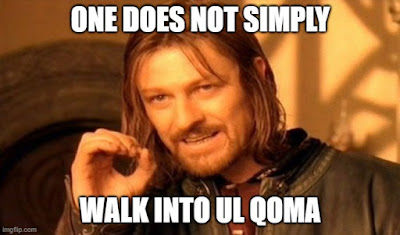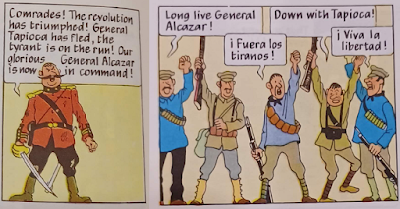The City & The City by China Miéville.
Evenin' all. The name's Borlú: Inspector Tyador Borlú of the Extreme Crime Squad. Yeah, I guess I'd call myself a maverick cop: don't always play by the book, but - dammit - I get results. Where? Well, I'm in Besźel, but there's another city as well - a city (takes drag on cigarette) .... OF THE MIND. Though, erm, also totally real (coughs). Anyway, I'm going to hand you back to your blogger now. No further questions; mind how you go.
Um, thanks. So we're in Besźel, a rather run-down city-state on the far Eastern edges of Europe, probably somewhere in the area occupied by Romania and Bulgaria, and Inspector Tyador Borlú of the Extreme Crime Squad has been called out because, well, there's been an extreme crime. Murder, in fact: a young woman found dumped naked under an old mattress on a piece of waste ground next to a newish housing development. But who is she? And why was she killed?
Borlú finds it frustratingly difficult getting his investigation off the ground, even the basic stuff like finding out the young woman's name. He soon realises that this is because he's starting his investigation in the wrong place. We need to do a wibbly-wobbly dissolve here for a bit of exposition. The city-state of Besźel, it turns out, occupies only a portion of the larger physical city where it is located. The other half(ish) of the physical city is occupied by the neighbouring (and rather more affluent) city-state of Ul Qoma, with a complex and circuitous border dividing the two, including areas of "cross-hatch" which are in both cities at once. But you can't just walk from one to the other, my goodness no; well, in fact you can in that it is physically possible, but it is forbidden in the strictest terms and if you do you will attract the attention of the shadowy organisation called Breach who police these things in a very robust way.

For that reason Besźel and Ul Qoma natives are conditioned from birth not only to avoid the possibility of physical breach but even to "unsee" things right in front of them which are in the "other" city. Even waving at someone across the city boundary, or reading a street-sign, admiring a building - these are all acts of mental breaching which run the terrible risk of bringing Breach down upon you, something you emphatically do not want.
Anyway, it turns out that the murdered woman is Mahalia Geary, an American student based in Ul Qoma and heavily involved in various archaeological digs there. But why would someone kill her? Well, it turns out that she was involved with various shady unificationist groups in both cities - people who, as the name suggests, want an end to the segregation of the city. In order to continue his investigation Borlú finds himself having to cross into Ul Qoma by the only legally permitted method, crossing at the single border point under Copula Hall, a building existing simultaneously in both cities. It's not quite as simple as that, though, as after a lifetime of studiously unseeing everything in Ul Qoma he now has to undergo a rigorous and intensive acclimatisation programme to teach him to flip all that on its head and instead unsee everything in Besźel.
On hooking up with some of Mahalia's associates - both the respectable kind at her place of study and the sketchier kind who shared her subversive views - Borlú becomes convinced that she was murdered because she knew something, something about the city, something that she was not meant to have known. But what? Could it be connected to her work on the fringe theory that there is actually a third city, Orciny, invisible to both Besźel and Ul Qoma and secretly controlling both?
Eventually things kick off when Borlú tries to smuggle Mahalia's friend Yolanda over the border back into Besźel and a sniper picks her off with a head-shot at the checkpoint. But she was in Ul Qoma and the shooter was in Besźel, so whose jurisdiction does it fall under? And since the murder occurred across the legal border boundary, no breach has technically occurred, so there's nothing for Breach to be interested in. Borlú soon solves that problem by chasing the sniper and shooting him. Trouble is the shooter is in Besźel and Borlú is in Ul Qoma, so this is an act of breach, and sure enough almost immediately various shadowy figures appear as if from thin air, seize Borlú, tranquilise his ass and spirit him off to a mysterious location for interrogation.
Once in the clutches of Breach Borlú soon realises that they are just a bunch of guys, albeit deadly combat ninja stylee ones, and moreover guys who are quite interested in what Mahalia knew, and Borlú now knows, which is why he hasn't just been summarily rubbed out and dumped in a canal like some of the more commonplace breachers. Some further detective work (facilitated by Breach's near-limitless powers within the city boundaries) reveals that the whole Orciny thing is a fairy-tale (if there is a shadowy third city it is Breach itself) designed to cover up a much more mundane scheme of corrupt selling-off of archaeological artefacts to large corporations, a scheme involving various high-ranking Besźel government officials who will stop at nothing to avoid capture, even arranging large-scale breachings and plunging the whole city/cities into anarchy.
As with many mystery thrillers the pay-off here (i.e. wherein the solution to the mystery is revealed) doesn't really match up to the build-up (it's some fairly vanilla cheesy corporate evil), but by the time we get to it (and all the various climactic explosions and shootings) that doesn't really matter as that's not what the book is about. What it is about is the perfection of the central conceit of the two cities, their geographical intertwining and the conditioned behaviour of their respective inhabitants. This is the sort of idea that constantly teeters on the edge of absurdity - the reader, in a way, is having to do their own "unseeing" to avoid the whole fragile construction shattering under the strain of its own implausibility. There are a few jarring moments when foreigners visit the cities and start galumphing about breaching left right and centre like a herd of bleedin' elephants where there is a danger of the reader taking a step back and saying: yes, actually this is a bit silly, but generally the reader is kept securely tethered to the central premise, something that takes considerable authorial skill and discipline.
No doubt there are a few metaphors being played out here: the fundamental absurdity of arbitrary lines on a map as dividing lines between groups of closely-related people on the ground, totalitarianism and the desire to control even the near-unconscious thought processes of your citizens (so echoes of Nineteen Eighty-Four, of course), but also the "unseeing" that most of us do every day (or at least every day during non-pandemic conditions when we're free to roam the streets) of litter, dogshit, homeless people, conflict, harassment, etc.
The most important thing to take away here, though, is that this is an absolutely terrific read for anyone even slightly interested in boundary-pushing fiction, mystery thrillers, or really just fiction in general, and I recommend it highly. Here's a brief interview with the author wherein he gives a potted summary of the plot.
The City & The City was adapted into a four-part TV series in 2018 starring David Morrissey (a former featuree here) as Borlú; obviously the key question you'll be asking is: how do they render the "unseeing"? And the answer is: with some blurring, like this. That works OK as far as I can see, though as it happens the mental picture I had was of the "other" city sort of receding to a lower-contrast, lower-brightness washed-out near-monochrome. Potayto potahto though, innit.
The City & The City also won a host of science fiction and fantasy awards - even though, unlike Miéville's earlier work, it arguably contains almost no elements of either genre - including the venerable Hugo Award, the other recipient of which to feature on this blog was The Dispossessed.







